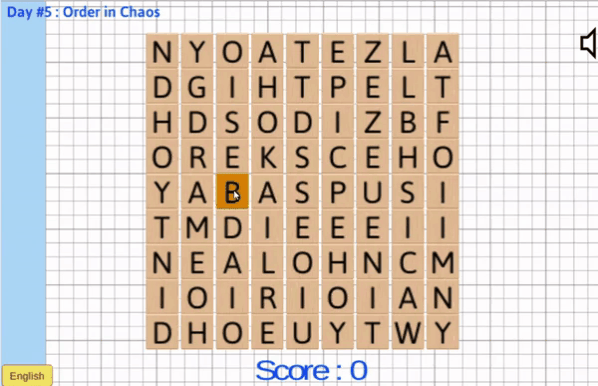
For Day #6, I had a hard time making up my mind about how I was going to tackle this fascinating topic. Word games have been around for a very long time. The game SCRABBLE democratized this genre well apart, and « Numbers and letters » then gave a place to this type of game in television shows.
Play the interactive Study here : https://loganou974.itch.io/gms-day-6-lexical-
This study was much richer than the previous ones: Indeed, each Word Game has a way to check if the word composed by the player exists. To be able to optimize this search time, you need a good knowledge of « Algorythm & Data Structures ». So, after some research, I noticed that the HashTables (or Dictionnary on Unity) was the Data Structure most suitable for:
– Quick access to a « small list » (here 58 000 words)
– A performance in reading rather than insertion
– because no insert needed
– and no sorting needed
Finally, in terms of game experience, I think it echoes the pleasure of « purification » (LeBlanc), the desire to put order in visual chaos. Moreover, word games trains the Linguistic intelligence (Gardner’s eight different intelligences). Gardner said that our schools and culture focus most of their attention on linguistic and logical-mathematical intelligence. Maybe that’s why most gamers hate Word Games because of it’s link with school. For most children, games (and video games) are a way to escape real life, they don’t want to feel like they play for another purpose than having fun. Or maybe gamers find Word Games unattractive because it’s a popular type of game among the elderly, making it « a game for old people ». Old people don’t have the huge video game background we had the chance to have. That’s why they play games like « Scrabbles » that are accessible with simples rules -that everyone can remember *cough* – but with infinite possibilities and replayability.
This feature can be applied to any game : Easy to understand, hard to master and replayability. That’s why Chess is one of the oldest game ever made.
Compared to a traditional Word Game, I left the player free choice to « cheat » by having the opportunity to search for letters that are not necessarily next, to make him want to « draw a route » that would allow a new combination of letters.
If a had more time, i would have make an A.I that would find the longuest word possible.